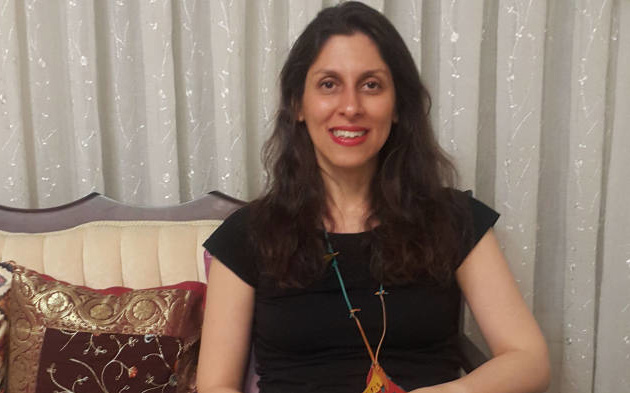Nazanin Zaghari-Ratcliffe at her parents’ home after temporary release from Evin Prison, Tehran, Iran, March 17, 2020
Members of the UK Parliament have called for action over Iran’s holding of British political prisoners.
In a Tuesday report, the Foreign Affairs Select Committee recommended designation of the detentions as “State hostage taking”. They called for proscription of the Reovlutionary Guards, which carries out and oversees the imprisonments, as a “terrorist” organization.
At least four UK-Iran dual nationals are in prison or under house arrest on electronic tag, all condemned to lengthy sentences.
Among them is the charity worker Nazanin Zaghari-Ratcliffe, seized in April 2016 as she was leaving Iran after a visit to relatives. Sentenced to five years for “espionage”, she was granted furlough in the spring amid the spread of Coronavirus. However, the former administrator for BBC Media Action has been repeatedly threatened with a longer sentence, including in September when a hearing was cancelled at the last minute.
See also UPDATED: Iran Authorities Threaten New Charge v. Political Prisoner Zaghari-Ratcliffe
Other UK-linked detainees include:
*Anoosheh Ashoori, a retired British-Iranian civil engineer arrested in 2017 and sentenced to 10 years
*Kameel Ahmady, a British-Iranian academic detained in August 2019 and sentenced to an 8-year prison term in December 2020
*Aras Amiri, an Iranian permanent resident in the UK and British Council employee, seized in March 2018 and serving a 10-year sentence
The Revolutionary Guards have detained a series of foreign and dual nationals in recent years. Some, such as Australian academic Kylie Moore-Gilbert, have been exchanged in prisoner swaps since last December.
However, those who remain include: Franco-Iranian academic Fariba Adelkhah, condemned to five years in prison and granted furlough in October; American oil executive Siamak Namazi and his 84-year-old father Baquer Namazi, a former UNICEF employee; Anglo-American-Iranian enviromentalist Morad Tahbaz; Swedish-Iranian researcher Ahmadreza Djalali, sentenced to death; and Austrian-Iranian nationals Kamran Ghaderi and Massud Mossaheb.
“State Hostage Taking”
Tom Tugendhat, the chair of the Parliamentary select committee, summarized its recommendations:
The UK government must call the arbitrary detention of foreign nationals what it is: hostage taking.
The charges, trials and convictions of British citizens on Iranian soil are a parody of a justice system. Using young mothers and retirees as bargaining chips and leverage is an unacceptable form of diplomacy.
The FCDO [Foreign, Commonwealth, and Development Office] has faced criticism for its apparent inertia and lackluster response to state-sponsored hostage taking, and it is clear that a more decisive, coordinated approach is needed.
The committee recommended a message to Iranian President Hassan Rouhani that abidance by human rights norms is a precondition of improved relations. Specifically, it suggested an addition to the 1979 Hostages Convention, defiing defining “State Hostage Taking” and prohibiting the practice. UK sanctions law will target specific Iranian human rights abusers.
The report also suggested renegotiation of the 2015 nuclear deal between Tehran and the remaining 5+1 Powers (UK, France, Germany, China, and Russia), including over Iran’s ballistic missile programme, extension of end dates, and expanded inspection authority for the International Atomic Energy Agency.
President Rouhani said on Monday that the incoming Biden Administration can return the US to the deal “within an hour”, but ruled out any renegotiation of terms.
See also Rouhani: No Preconditions on US Return to Iran Nuclear Deal

